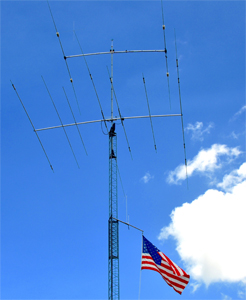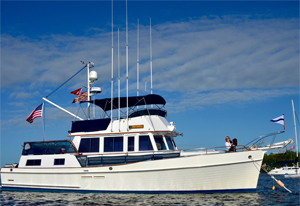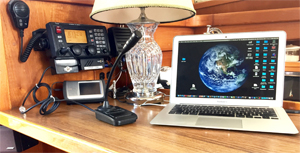The Seven Seas Cruising Association (SSCA) is the oldest and largest worldwide organization supporting the full-time cruising lifestyle. The SSCA promotes safety and fellowship among the cruising community and a prime method to do this is through communications. To that end, SSCA has recently been issued a Public Coast Station License (call sign “KPK” by the FCC — more on that below) that helps SSCA to more effectively assist voyagers at sea and in foreign waters.
With the advent of the Internet, email, cellphones and social media, most people have the capability of being connected 24/7. This is not the case for a vast majority of the cruising community who elect to cruise in remote locations of our globe. For those cruisers, the principal way to remain connected is through high-frequency (HF) radio.
It’s not an overstatement to say the majority of offshore bluewater cruisers have a high-frequency radio aboard their vessel. While many cruisers are licensed amateur radio license holders, the majority rely on the use of marine HF/single sideband radios. Each morning these cruisers start their day by listening to, and participating in, SSB radio nets and often end their day checking into nets as well.
Whether tuning into weather router Chris Parker of the Marine Weather Center for weather forecasts (8.137 MHz), or participating on regional nets such as the Cruiseheimers Net (8.152 MHz), Coconut Telegraph Net (8.170 MHz), Panama Connection Net (8.107 MHz), Northwest Caribbean and Southwest Caribbean Nets (6.209 MHz), and the afternoon Doo Dah Net (8.152 MHz), these radio nets are how the cruising community communicates on a daily basis. These daily nets are the equivalent of several well-known and respected amateur radio nets servicing the cruising community such as the Waterway Radio and Cruising Club (7.268 MHz) and the Maritime Mobile Service Network (14.300 MHz). Operating times and further information on these and other maritime nets can be found in a printable format at www.docksideradio.com.
 |
|
The KPK radio tower and antenna in Florida. |
|
Glen Tuttle |
Often times, the U.S. Coast Guard asks that reports of overdue vessels, hazards to navigation and other serious matters of safety be relayed via these nets. But it is often the vessel operators themselves who must use their HF radios to send a mayday, broadcast a pan-pan message, report routine safety messages or request some form of assistance from land-based resources.
The SSCA currently provides “on-the-ground” support to cruisers through our worldwide network of cruising stations. The SSCA has recently initiated a SSB Voice Net, which widens the support of cruising stations over the air, extending a helping hand to any cruiser with an HF radio.
Recently the SSCA applied for and was granted a Public Coast Station license by the FCC (the coast station call sign is KPK). At the present time, KPK broadcasts on frequency 8.104 MHz for 15 minutes beginning at 1215 UTC, or 0715 EST.
The purpose of this service is to:
1. Relay emergency and priority traffic information, as well as traffic information related to safety and security.
2. Provide current news updates of interest to cruisers from such sources as the Caribbean Safety and Security Net, Noonsite, The Salty Southeast Cruisers Net, Caribbean Compass, Bahamas Chatter and others.
 |
|
Like many SSCA members, Tuttle is an HF SSB radio enthusiast, as shown by the antennas on his Grand Banks 46, Tothill. |
|
Glen Tuttle |
3. Provide any vessels needing assistance with land-based resources. KPK can assist with radio checks, float plans, telephone contact with family and friends, boat-to-boat relays, access to medical or mechanical professionals, marinas, Internet searches or any other assistance that they may be able to provide.
Through a partnership with the Caribbean Safety and Security Net (www.safetyandsecuritynet.com), any report of a safety and security nature occurring in the Caribbean will be immediately provided to the CSSN. Likewise, any recent incident posted on the CSSN website will be announced during KPK’s broadcast.
The Caribbean Safety and Security Net’s primary mission is the collection and dissemination of accurate information relating to crimes against yachts in the Caribbean, enabling cruisers to make intelligent decisions about how and where they cruise.
Although KPK is a service provided by the SSCA, all vessels are welcome to participate. KPK also welcomes relay assistance.
Relay assistance is often necessary when using high-frequency radios, which rely on propagation, or how radio waves travel through the atmosphere from one place on Earth to another. These radio waves are affected by various atmospheric phenomena, but the result is that Station A may have effective communications with Station B 1,000 miles away, but poor communications with Station C 500 miles away. Therefore, relay stations are often needed to cover an entire geographic area during a radio net. KPK’s initial goal is to blanket the entire east coast of Canada and the U.S., down into the southern Caribbean and South America. The SSCA has many members who are amateur radio operators, with large directional antennas on their home property. The SSCA is currently looking into the feasibility of having several of these ham radio enthusiasts added to the SSCA’s existing FCC license to permit them to act as relay stations. A network of relay stations going south from Massachusetts to Marathon, Fla., would greatly enhance the capability of its existing service.
 |
|
The radio setup aboard Tothill. |
|
Glen Tuttle |
One of the first “customers” of KPK happened to be members of the SSCA, cruising on their boat, La Luna, in Panama. They were returning to the U.S. via the Yucatan, and needed to make an unscheduled stop in Isla Mujeres, Mexico. They contacted KPK on the morning net and asked if we had any information on anchorages and customs and immigration procedures in Isla Mujeres. I was able to make a phone patch to another SSCA member, Bob, on the yacht Sunrise, who had just returned from Mexico. Bob was able to answer all of La Luna’s questions prior to their arrival in Mexico.
Two other examples of KPK’s service to offshore cruisers happened in the first week of January. One, a sailing vessel making a passage from Jamaica to Panama made a safe arrival and asked KPK to notify their family so they wouldn’t worry. The family member was very relieved to know of their safe arrival in Panama.
Another case of KPK’s service to cruisers involved our partnership with the Caribbean Safety & Security Net (CSSN). In late December there were two separate boardings and robberies of yachts during passages between Trinidad and Grenada. Both incidents occurred in a certain area south of Trinidad. During the first week of January, a sailing vessel was going to be passing through these dangerous waters on their final leg of crossing the Atlantic Ocean. KPK was able to notify the sailing vessel of the dangerous area they would be approaching so they could take additional precautions while transiting the area.
Our plan for the SSCA radio station is to address the area with the greatest number of cruising members. If our effort is as successful we’ll explore a similar effort on the Pacific coasts of the U.S. and Mexico. Conceivably, we’ll expand to coast stations beyond the U.S. to cover the eastern Atlantic and South Pacific.
Glenn Tuttle, (K9TUT), is on the SSCA board of directors, and serves as the Net Manager for SSCA radio station “KPK.” He’s also Commodore and Net Manager of the Waterway Radio and Cruising Amateur Radio Club and a member of the CCA. He and his wife Eddie cruise aboard their 46-foot Grand Banks Tothill. Send comments or suggestions on “KPK” to KPK@ssca.org.

